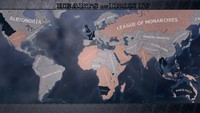Part 110: World at War
Chapter 5 — World at War — May 1938 to January 1939The Peace of Prague was built on shaky foundations and preserved through sheer will, but by the first summer days of 1938, it had given way to a string of devastating conflicts that raged from Gharbia to Europe to the Near East — and that was only the beginning. Peace was fragile and precarious, a house of cards that constantly sways and lurches in the wind, with the only certainty being its eventual collapse.
And true enough, the world would be wreathed in the flames of war by the end of the year, a chain reaction that begins in the wreckage of Hamburg — captured by the Iberian Expeditionary Force in the early days of May, after two months of vicious combat and ruthless bombing.


The expeditionary force had become renowned for their uncompromising discipline and timely breakthroughs, but that would be their last action in the German Civil War, as the experienced volunteers were recalled to Iberia to serve in their own campaigns…

Behind them, the battle for Germany continued with the communists finally capturing Kiel and defeating the liberals, whilst the monarchists managed to crush the last pockets of fascist resistance to the south. The fate of the country now rested between Frankfurt and Vienna, but with the former controlling the biggest population and industrial centres, a red Germany was looking increasingly likely with every passing day.


And the Great Powers knew as much, with the recent string of communist victories sending a wave of panic reverberating across Europe. The Franks wouldn’t stand idly by whilst communism grew stronger, but the Russians weren’t happy with a fascist Europe either, with their isolationist policy becoming the subject of intense debate in the political circles of Smolensk.
That particular debate wouldn’t end in discourse, however. Instead, it was settled when a gunman shot and killed the Prime Minister of Russia, Yuri Antonov. The assassin disappeared within moments, leaving an outpouring of public chaos and mayhem in his wake, forcing the government to announce emergency elections within the week.

Just beyond their borders, the Caucasian Wars had taken an abrupt turn after the Caspian Republic collapsed before a combined assault from Georgia and Azerbaijan. This temporary alliance quickly turned their guns on one another, of course, with the struggle for dominance in Caucasia entering its final months.

To their immediate south, meanwhile, another war had just come to an end. The campaign was short and decisive, with Kurdish armies swarming southwards and overwhelming their tribal enemies within weeks, capturing Mecca and Diriyah and Muscat in quick succession.
And with the Great Powers distracted by their conflicts or consumed by internal unrest, the Emir announced that the Arabian state would be dismantled and annexed to the Vali Emirate, just until the peninsula had stabilised.


Across the width of the globe, the Ibrizi War had gradually devolved into a conflict eerily-reminiscent of the Great War, with hazardous operations and risky encirclements giving way to static frontlines and trench warfare. Slowly but surely, it was starting to look like this would become a war of attrition.

The same could be said for the conflict raging in South Gharbia, where New France had managed to repel the initial Occidental invasion, only for their counter-attack to end in crushing defeat. Considerable arms and supplies continued pouring in from Imariz, but it had gained them nothing save for a few worthless towns and villages…

And it wouldn’t get much better. Late in June, almost a year after the war had first erupted, the Andean Republic launched a sudden assault across their northern border, taking their enemy by surprise and driving towards the Guayas River in a relentless offensive.
The Berber Union scrambled to impose order, but needless to say, New France’s prospects weren’t looking too bright.


Back in Germany, meanwhile, the civil war was proceeding as expected. Even without Iberian help, the communists gradually pushed the monarchists eastward over the course of July and August, capturing Stuttgart, München and Nuremberg in a series of bitterly-fought battles.
The monarchists simply didn’t have the numbers to challenge their enemy, and unless their allies took a more active role, then the German Civil War would be over by the new year.
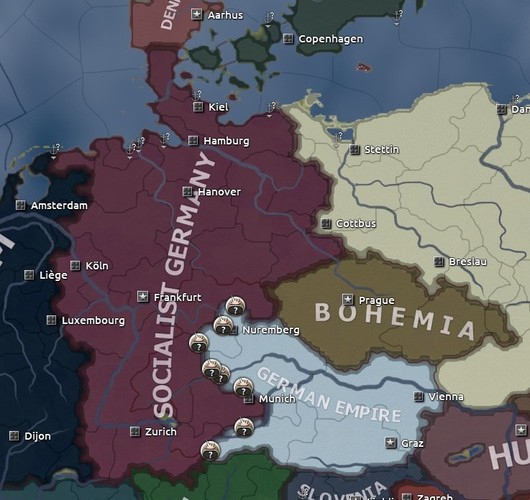
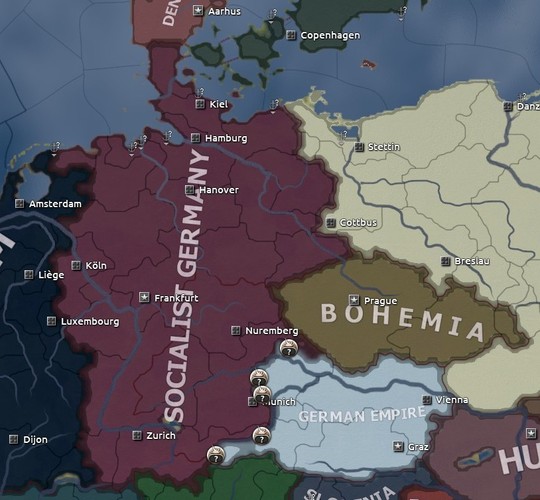
Fortunately for the Kaiser, that’s precisely what the Russians intended to do.
Or more accurately, that’s what the Russian liberals intended to do. Infuriated by the socialists’ continued policy of suicidal isolation, the liberals weren’t willing to go through another divisive and frenzied election campaign, not while fascists and communists were swarming across the continent. So instead, they turned to the nobility…
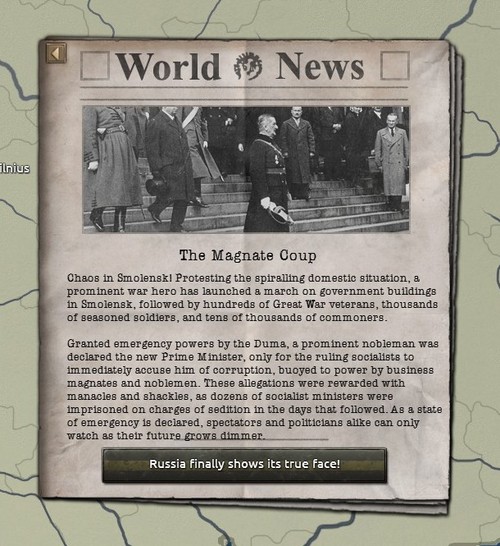
…who seized power in the Magnate Coup, thrusting the capital into chaos as public protests and demonstrations and marches rocked Smolensk. The crisis only came to end when Imperator Alexandrovich intervened, dissolving the parliament and declaring a state of emergency.
The emperor had not used his imperial prerogative in decades, but with the continent engulfed in war, he chose this moment to appoint a prominent noblemen to the position of Prime Minister, with any dissenters quickly apprehended and arrested.
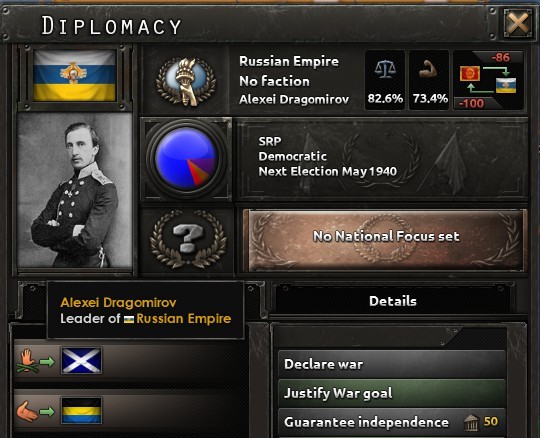
Alexei Dragomirov immediately took to the stands and delivered a speech in which he declared an end to isolation, promising to turn the guns and tanks of Russia towards the west, towards the red revolutionaries and black radicals, towards Germany and Francia.
Unfortunately for him, however, that wasn’t to be…
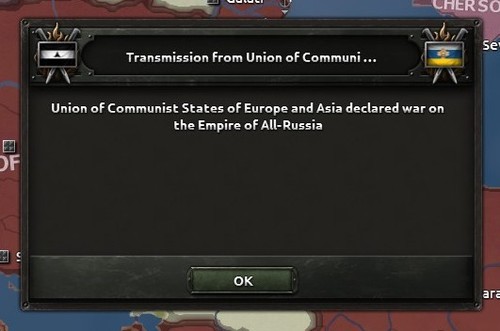
The attack came with the rising sun on the 29th of September, undeclared and unexpected, as hundreds of warplanes blackened the skies above Tsargrad in a relentless wave of shelling and bombardment. Thousands of Russians were killed, hundreds of planes were damaged and dozens of ships were sunk, and just as the news reached Smolensk, the Chairman of the Communist States of Eurasia issued an ultimatum — surrender Tsargrad, or suffer a full-fledged invasion.
Russia would reply with bullets and blood.
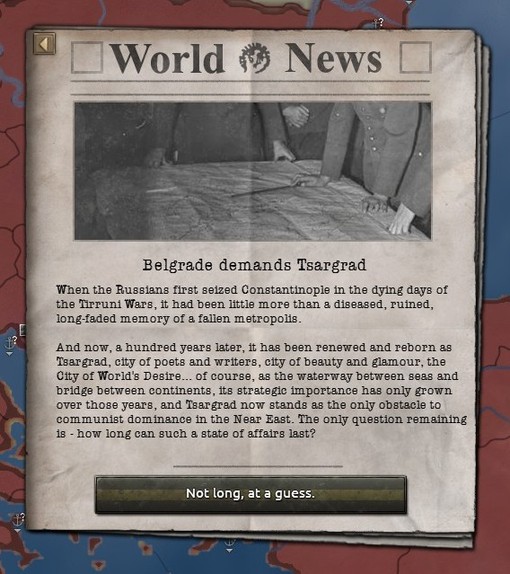
As communists and liberals clashed over the City of World’s Desire, the 5th of October saw the Supreme Leader of the Iberian Union make a momentous announcement in Qadis.
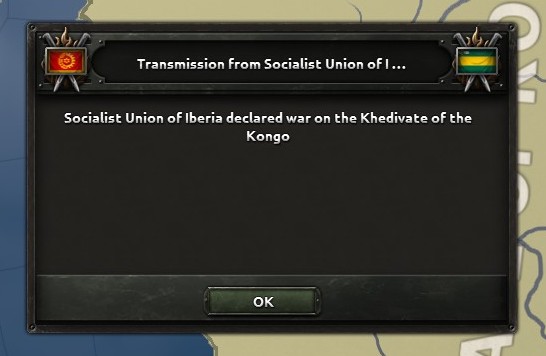
The past few months had been spent preparing and planning for a secret operation, with the project only coming to light when the Socialist Shura voted overwhelmingly in favour of invading the Khedivate of the Kongo, almost immediately followed by an assault on a large naval base a few miles south of Madinat Balanabus.
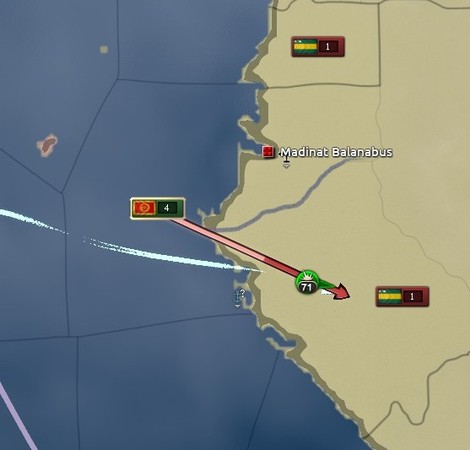
Unfortunately, the early days of the campaign weren’t very promising. After a vicious battle on the beaches and shores of Gabon, the Iberian invasion force was repelled with heavy losses, forced to withdraw to Cape Verde.
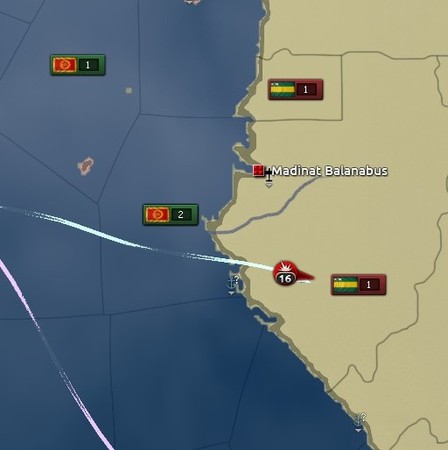
The Supreme Leader didn’t gamble everything on a single invasion, however, and the stinging defeat was quickly followed by another assault further south, not far from the mouth of the Kongo River.
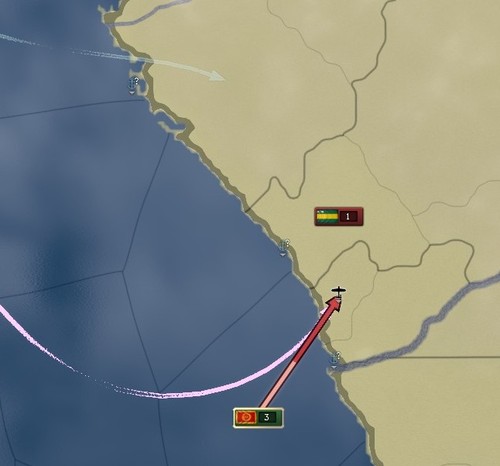
And this time, the Iberians were able to seize a foothold on the mainland, striking outwards and capturing strategically-vital harbours to the north and south. By the end of October, their position was secured and fortified, with the high military command back in Qadis breathing a collective sigh of relief.
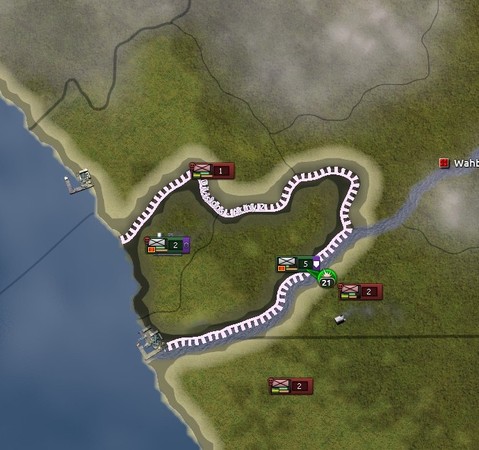
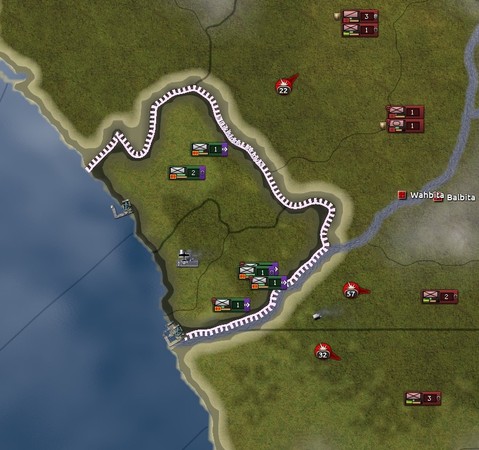
That relief wouldn’t last for very long, however.
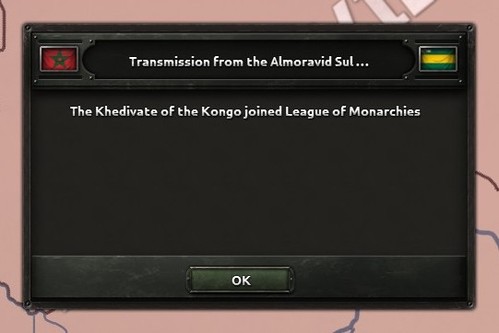

Whilst bullets were being traded on the banks of the Kongo River, the Khedive was in meeting with a Moroccan embassy, desperately negotiating for their support in the conflict.
And he would receive much more than that. The Almoravids had overlooked the remilitarisation of the Pyrenees and condoned the rearmament of Iberia, but they couldn’t turn a blind eye to this naked aggression, not on their continent. So the Khedivate of the Kongo was formally inducted into the League of Monarchies, and just a day later, the Almoravid Sultanate declared war on the Iberian Union.
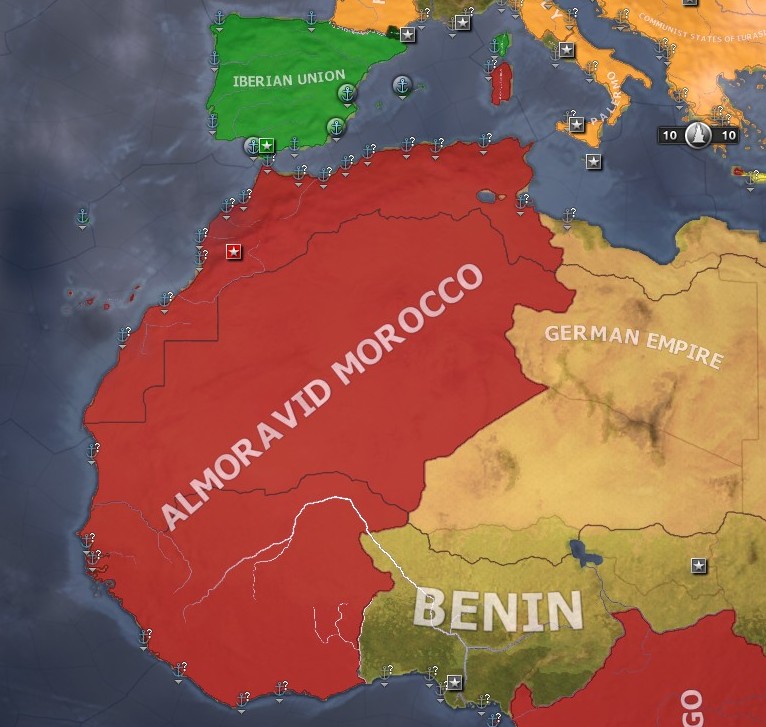
War was declared on the 2nd of November, and it wouldn’t be very long before the news began to spread. In East Africa, tensions had been rising for months over the proposed damming of the Nile, mirrored by the deployment of hundreds of thousands of soldiers to the Egyptian-Moroccan border.
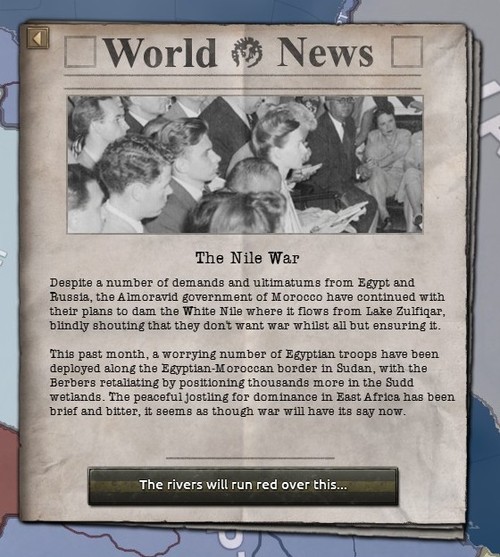
And with the outbreak of war between Qadis and Marrakesh, the Egyptians would have no better opportunity to secure their southern border and seize the the rest of the Nile, with King Apanoub declaring war on Almoravid Morocco on the 10th of November.
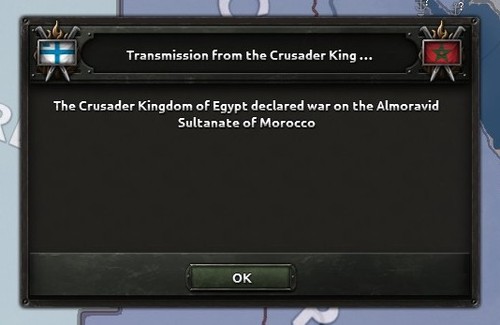

At the same time, bloody clashes were raging around the Sea of Marmara as communist forces drove the Russians behind the walls of Tsargrad. The city wouldn’t impede them for long, already being bombed without respite, but the battles in Romania and Adjara were quickly becoming bloody stalemates — a disaster, when Belgrade’s plan depended upon surprise and speed.
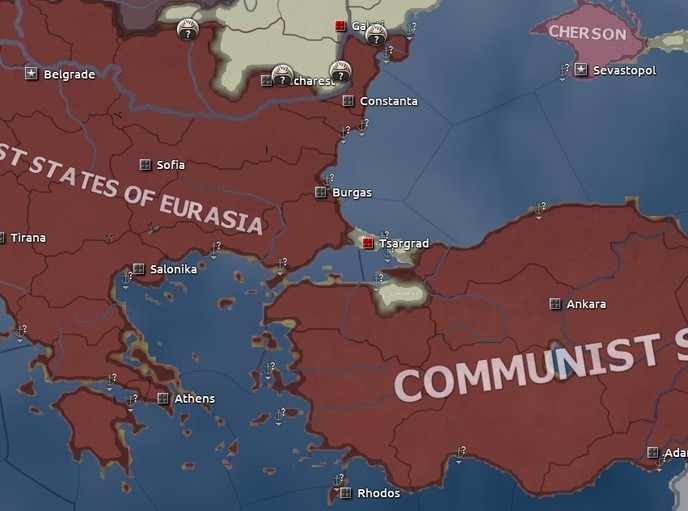
So they turned their gaze eastward, where the Caucasian Wars had just come to an end…
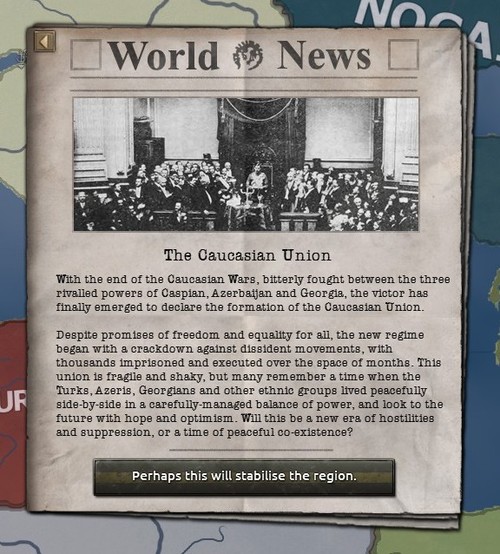
Azerbaijan had emerged victorious in the desperate struggle, with the Sheikh declaring himself the “Emir of Al-Qawqaz”, but his emirate had been reduced to a bitterly-divided region, devastated and impoverished by the past year of unrelenting warfare.
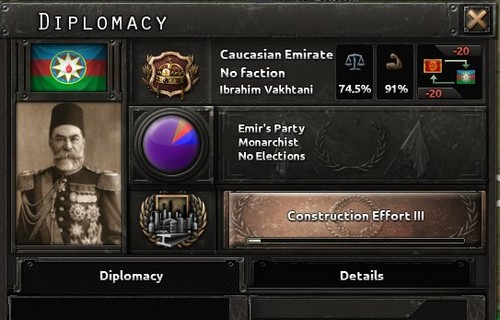
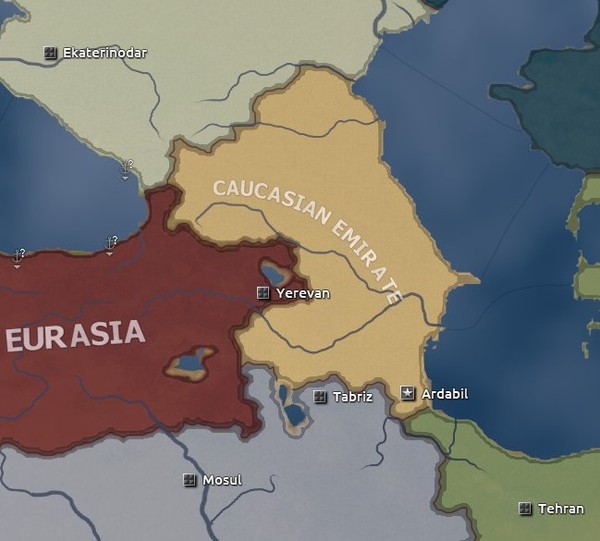
And the Chairman of the CSE would take advantage of that. Hoping to outflank and encircle the eastern Russian army, he demanded free and unfettered military access through the Caucasus, access that the newly-declared Emir of Caucasia was unwilling to provide.
With his ultimatum spurned, the Chairman ordered troops to cross the border on the 15th of November, sparking yet another war.
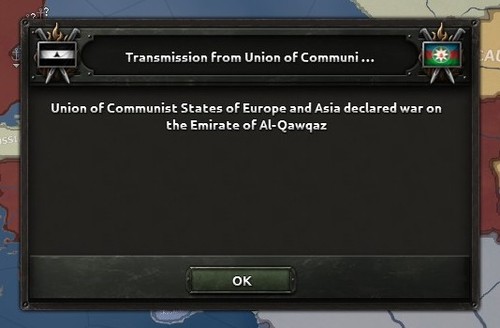

This would prove to be a foolish move, however, because the Emir had negotiated a military and economic pact with Almoravid Morocco a few months prior. Belgrade might’ve hoped that the Moroccans — already distracted by wars with Iberia and Egypt — would renegade on this pact, but they had no such luck.
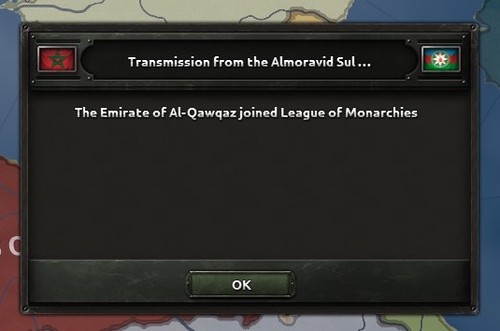
That would be a stroke of genius by the Almoravids, because it brought them into direct conflict with the Communist States of Eurasia, making them allies of convenience with… Russia.
And with a burning hatred for communism sweeping across Russia in the aftermath of the surprise attack on Tsargrad, it was only natural that they would join forces with Morocco, with Alexei Dragomirov declaring their entry into the League of Monarchies on the 21st of November. Transforming their alliance of convenience into an ironclad pact, the Prime Minister of Russia and Grand Vizier of Morocco delivered a joint address in which they vowed to make peace only when the communist menace had been crushed.
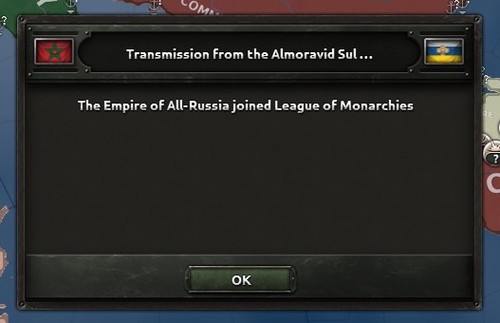
With that, the invasion of the Kongo had spiralled into a world war over the space of one month, with the Iberian Union suddenly finding itself at war with the Khedivate, the Almoravid Sultanate and her colonies, the Caucasian Emirate, the Russian Empire and the Islamic Republic of Ibriz.
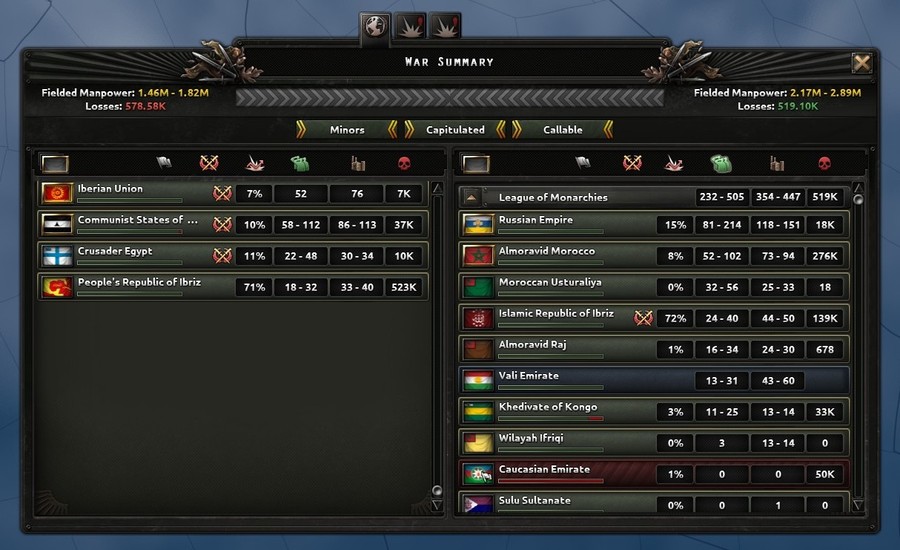
And to the anguish of the Supreme Leader, it was only going to get worse.
To the north, the Frankish wars with Liege and Scotland had finally come to an end. Liege had been crushed within weeks, but Scotland proved a more difficult conquest, with the influx of volunteer divisions from Russia, New England and Berber Union delaying the Frankish conquest by several months.
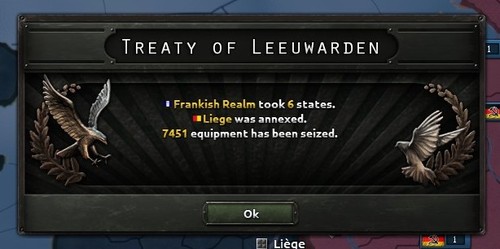
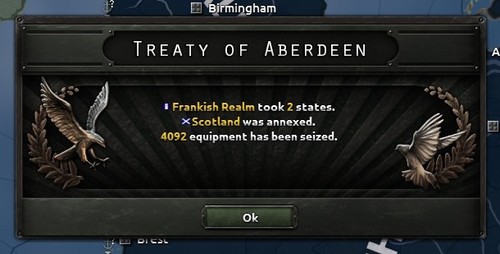
They couldn’t withstand the formidable Frankish Army forever, unfortunately, with Jacques Vernier declaring the conquests of Britain and Holland complete in December of 1938. And he wasn’t done yet, not by a long shot…
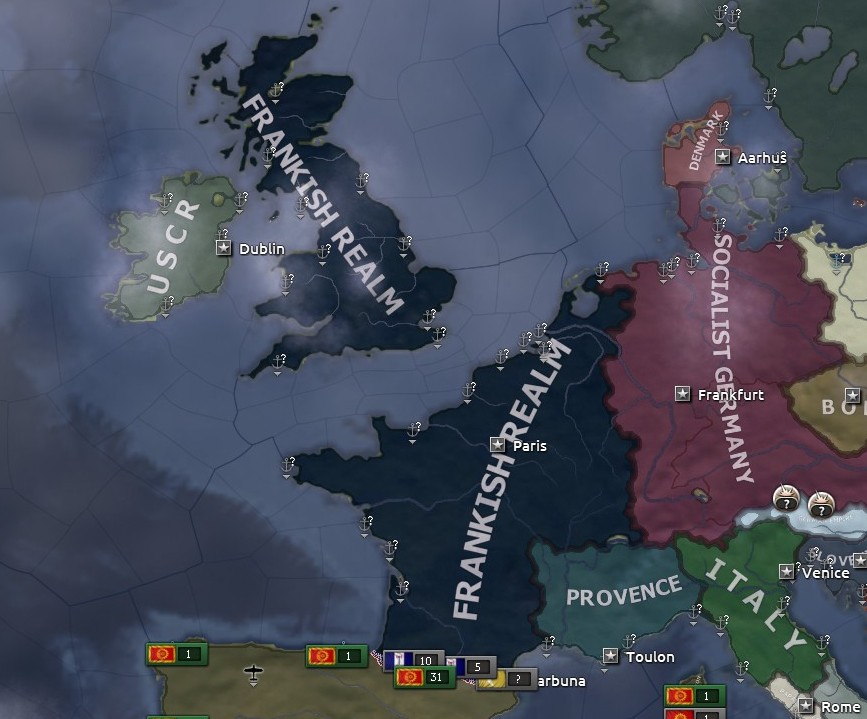
A few weeks after military rule was established in Liege and Scotland, the Commandant of the Frankish Realm delivered a public address from his Parisian mansion, with the dictator vehemently declaring that his “unification of Europe had begun.”
The obsessive masses gathered beneath the balconies likely had no idea what he meant, but at that very moment, hundreds of thousands of soldiers were flooding into Provence and Germany, supported by hundreds of tanks on the ground and thousands of planes in the air.
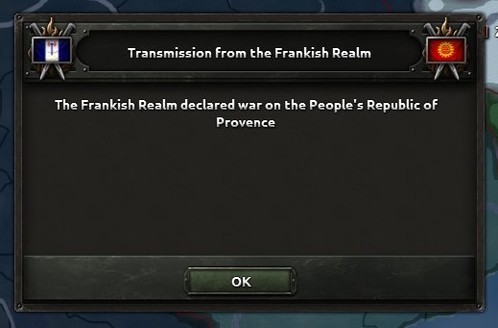
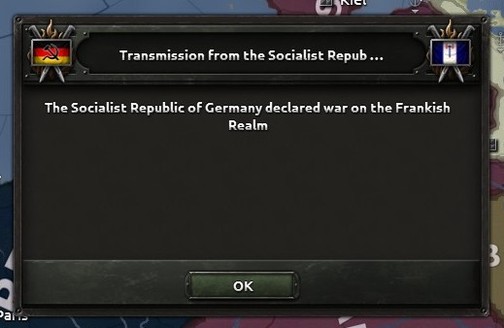
This auspicious timing was no coincidence, of course. With the other Great Powers preoccupied with wars of their own, Vernier had chosen this exact moment to strike eastward and realise his ambitions — and so the Frankish invasion of Europe was finally underway.
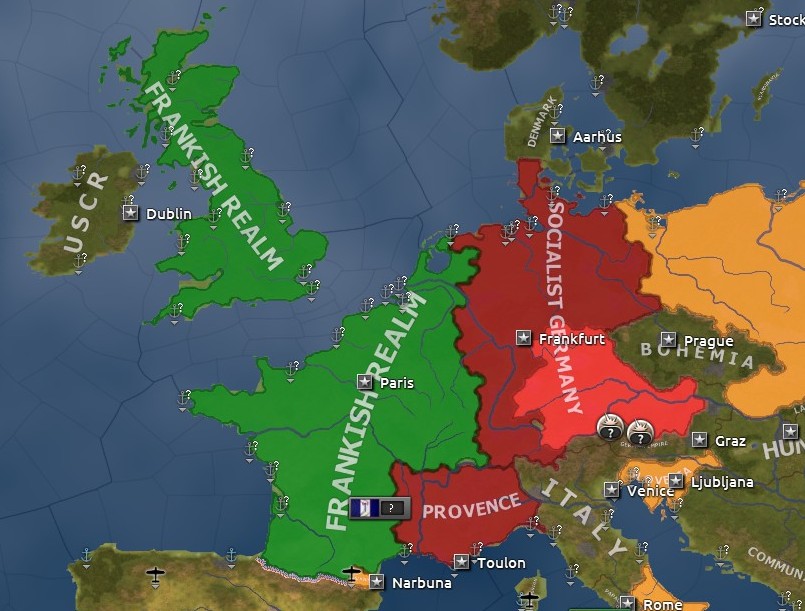
The Germans immediately rushed to their undermanned western border, whilst the Provencal dispatched a desperate plea to Qadis, bidding the Supreme Leader to honour their defensive pact. Already facing a daunting war to the south, however, Mizanur is forced to turn to the Shura instead…
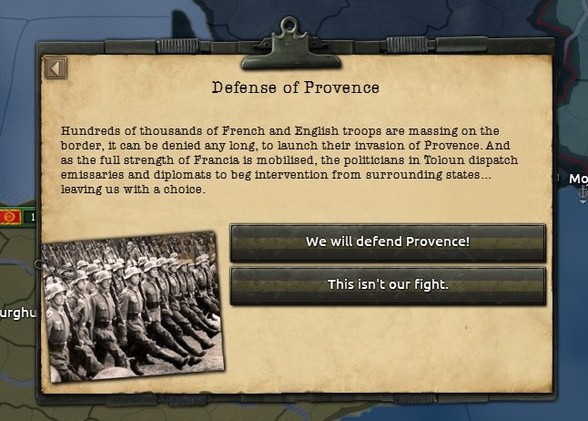
Whatever their decision, these flames would not be smothered or quenched so easily, promising to burn until the entire world is ablaze. The Peace of Prague has reigned for fifteen years, but that peace is finally at an end, and war will have its say now.
World map:
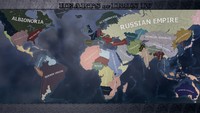
Faction map:
